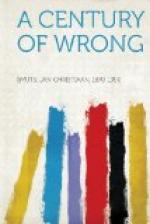The fundamental sentiment which governed the policy of the second period was a feeling of regret at having made this mistake, coupled with the firm determination to set aside its results. These wild and useless tracts, which had been guaranteed to the Boers, appeared to be very valuable after the Boers had rescued them from barbarism, and opened them up for civilisation. It was felt that they ought to gleam amongst the jewels of Her Majesty’s Crown, notwithstanding the obstacle in the treaties that had been concluded with the Boers. This was the concealed intention. As far as the means were concerned—they were, from the very exigency of inborn hypocrisy, partly revealed and partly concealed; the one differing from the other, as light from darkness. The secret means consisted in arming the Kaffir tribes against us in the most incredible manner, and in inciting them to attack us in violation of solemn treaties and promises. If this policy succeeded the real objects and means could be suppressed, and England could then come forward and pose openly as the champion of peace and order, and as the guardian angel of civilisation in this part of the world. The Republics could then be annexed under cover of these plausible pretexts. This policy failed as far as the Orange Free State was concerned, because the brave burghers of the neighbouring Republic succeeded, after great difficulty, in overcoming Moshesh, notwithstanding the fact that their arms and ammunition had been illegally stopped by the British Government. England was compelled in that case to confine itself to the protection of its “Basuto” tools. The British, however, succeeded in preventing the Boers from reaping the legitimate fruits of their victory, and in annexing the Diamond Fields—a flagrantly illegal act.
As far as the South African Republic is concerned, it was unfortunate that the burghers were not vigilant enough to foresee and prevent the crafty policy of the enemy. As the Transvaal Boers had subdued the most powerful Kaffir tribes, they never dreamt that the insignificant Kaffir wars in which they had been involved through English intrigue would have been seized as a pretext to annex their country to the British Crown. They had been remiss in not putting their full force into the field so as to bring these little wars to a speedy conclusion. And so the Magato and Socoecoeni campaigns were conducted in a protracted and half-hearted way, much to the satisfaction of Sir Theophilus Shepstone, and those who were at his back.
The Annexation was brought about. It was announced that the extension of Her Majesty’s sway and protection over the South African Republic could alone secure unity of purpose and trade, as well as open out a prospect of peace and prosperity. In these words of Shepstone’s proclamation we see in all its repulsive nakedness the hypocrisy which openly masqueraded in the guise of the disinterested and pitiful Samaritan, while its true and secret object was to inflict a fatal wound upon the burgher Republic.




